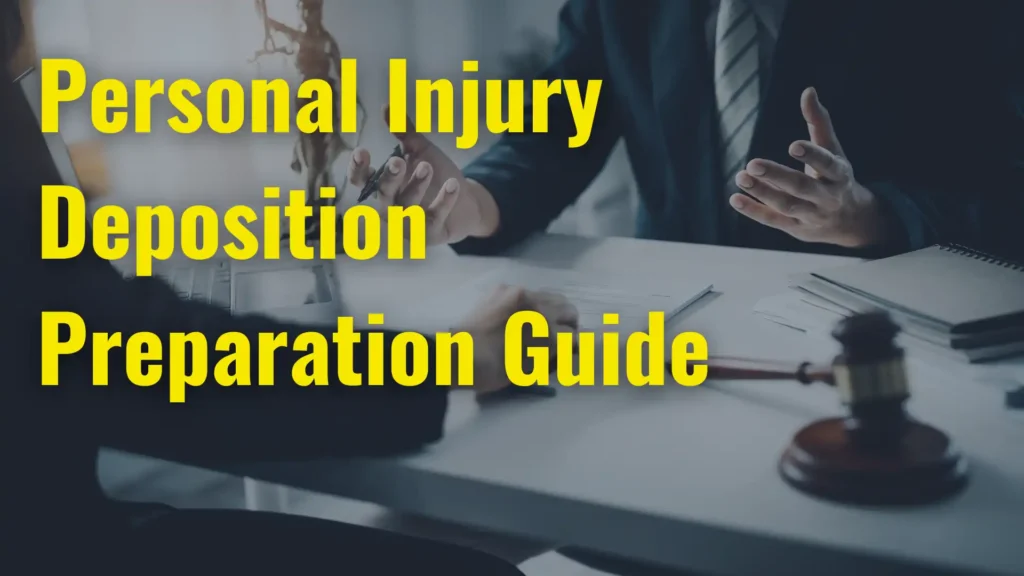
If you’re considering filing a personal injury claim after an accident or are already involved in legal action, you may need to give a deposition. This can be an intimidating experience, especially if you don’t know what to expect. A deposition involves answering questions under oath, and your responses can significantly impact your case. In this guide, discover how preparing for depositions is not as intimidating as it seems.
The Memphis personal injury lawyers at Gatti, Keltner, Bienvenu & Montesi, PLC are here to support you, give you legal advice, and help you properly prepare for a deposition. Our personal injury attorneys can give you the tools and confidence to handle your deposition smoothly. With our guidance, you can feel more secure and ready to present your story. Below, you’ll find more info on what’s involved in a deposition and tips to make this process less intimidating.
What to Expect at a Deposition
When preparing for depositions, knowing the entire process is important. During a deposition process, the legal team for whomever you’ve filed a claim against will ask you to provide sworn testimony about the details of your case. The setting is typically more informal than a courtroom, as depositions usually take place in a conference room with attorneys from both sides present. A court reporter will also record everything said during the deposition.
The process begins with the opposing attorneys asking questions about your accident, injuries, and treatment. The questions from the opposing counsels can cover a wide range of topics, including how the accident happened, the extent of your injuries, your medical history, and how the injuries have affected your daily life. It’s important to answer each question truthfully and to the best of your ability, as your testimony is given under oath.
Your attorney will be present during the deposition to provide support and object to inappropriate questions. Before the deposition, they will help you prepare by reviewing potential questions and advising you on responding clearly and confidently. During the deposition, it’s essential to stay calm and composed. Consider each question before answering, and don’t hesitate to ask for clarification if you don’t understand something. Remember, your goal is to provide accurate and honest answers that support your case.
How Long Does a Deposition Last?
The length of a deposition varies depending on the case’s complexity and the number of questions involved. The process may be over in a few hours for straightforward cases, while more complex cases with extensive details and multiple parties can take longer. It’s important to note that most depositions include time for breaks, so you can take short pauses to rest and collect your thoughts. Your attorney will be present throughout the process to support you and ensure everything proceeds smoothly. While it may seem lengthy, thorough preparation and understanding of what to expect can help you manage the time effectively and reduce stress during the deposition.
Get a free case review today. There`s no fee unless we win!
What To Wear to a Deposition
When preparing for depositions, you should know what to wear. A deposition is a formal legal proceeding, and it is crucial to dress appropriately to show respect and take the process seriously. Your attire should reflect the occasion’s significance, much like how you would dress for a courtroom appearance.
For men, wearing a suit or a blazer with dress pants, a button-down shirt, and a tie is advisable. Ensure your clothes are clean, well-fitted, and free of wrinkles. For women, a business suit, a conservative dress, or a blouse with dress pants or a skirt is suitable. Avoid overly casual clothing like jeans, T-shirts, or sneakers.
Grooming also matters. Ensure your hair is neat, and avoid excessive jewelry or strong fragrances. Dressing professionally shows respect for the legal process and helps you feel more confident and prepared for your deposition. Your appearance can leave a positive impression and contribute to the seriousness with which your deposition testimony is received.
Over $500 Million
Recovered on Behalf
of Our Clients
Preparing for a Personal Injury Deposition
Preparing for a personal injury deposition can feel overwhelming. With the proper guidance and preparation, however, you can approach it with confidence. Here are some tips to help you get ready for your deposition:
- Review Your Case Details: Familiarize yourself with all case details, including the accident, your injuries, and your medical treatments. Refresh your memory by reviewing any documents, medical records, and notes you have related to the incident.
- Practice Answering Questions: Work with your attorney to practice answering potential questions you might face. This can help you reduce anxiety during the actual deposition. Remember to answer each question truthfully and concisely.
- Understand the Process: Know what to expect during the deposition. Your attorney will explain the process and the roles of everyone present. Understanding the procedure can help alleviate any fears or uncertainties.
- Stay Calm and Focused: It’s natural to feel nervous but try to stay calm and focused. Take your time to think about each question before answering. If you don’t understand a question, asking for clarification is okay.
- Be Honest and Accurate: Always provide honest and accurate answers. If you don’t know the answer to a question, it’s okay to say so. Avoid guessing or speculating, as this can harm your credibility.
- Avoid Volunteering Information: Answer only the question asked and avoid providing additional information. Keep your responses brief and to the point. Volunteering unnecessary information can complicate your case.
- Review Documents: Review any documents you’ve provided or received related to your case. Make sure you understand their contents and be prepared to discuss them if asked.
- Take Care of Yourself: Ensure you are well-rested before the deposition. Being physically and mentally prepared can help you stay alert and focused during the questioning.
Fighting for the MAXIMUM
Money for You
The Importance of Working with a Skilled Lawyer to Prepare for a Deposition
Getting help from a legal professional is imperative when preparing for depositions. Without proper preparation, you might say something that could hurt your case or get you in legal trouble. A lawyer can help you prepare potential answers to the other side’s questions, gather and review relevant documents with you, pick out an appropriate outfit to wear, and protect you during the actual questioning process.
With over 40 years of handling notable cases, Gatti, Keltner, Bienvenu & Montesi, PLC has helped many people like you prepare for personal injury depositions. Our team of attorneys is here to make this process less scary and assist you in your fight for fair compensation. Contact our law firm at (901) 526-2126 or through our online form for a free case evaluation.

